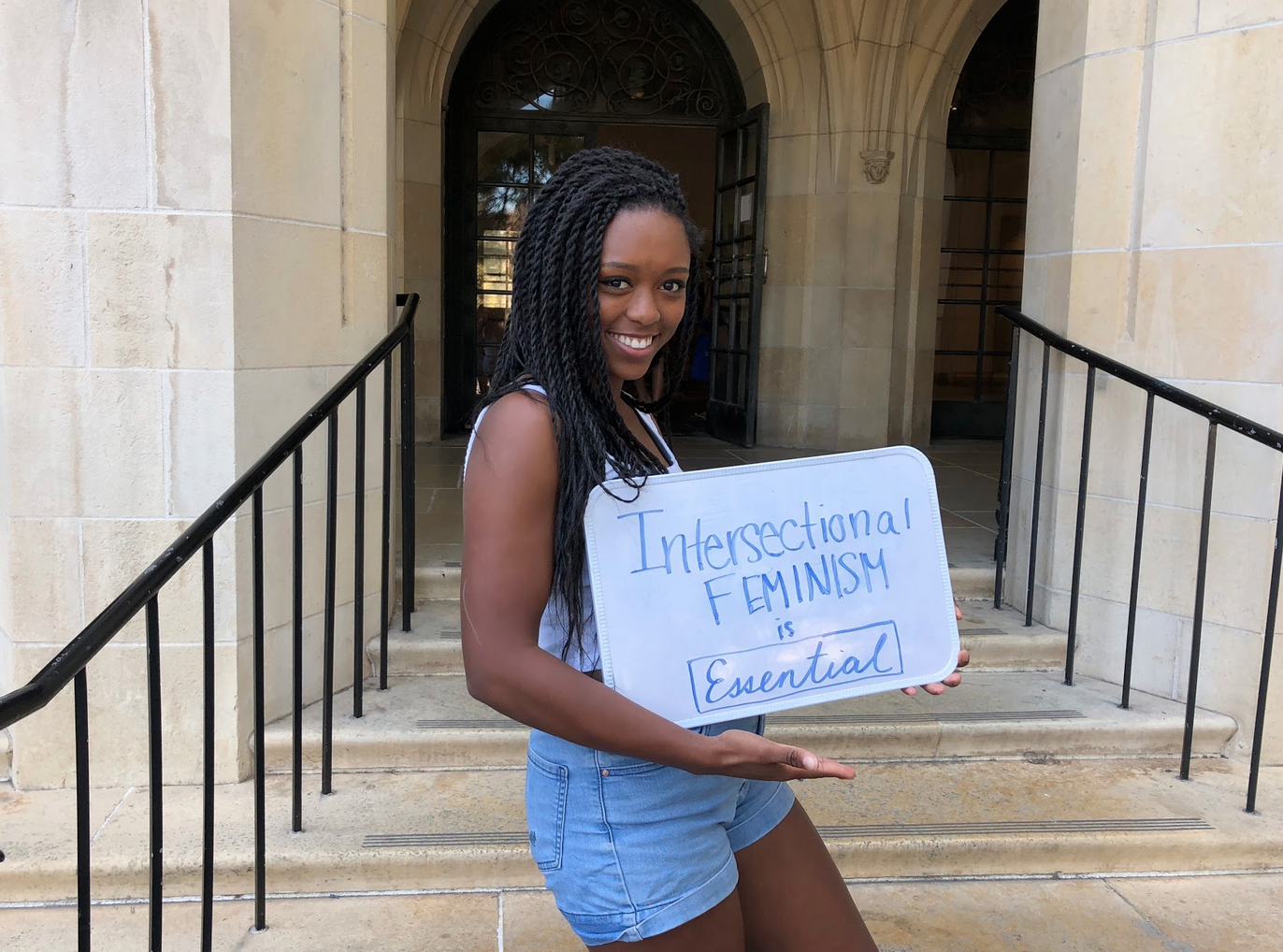Featured UCLA Feminist: Jada Banks-Mace

Photo by Mihika Sridhar
Jada Banks-Mace is a passionate intersectional feminist and third-year psychology student minoring in gender studies. Jada articulates intersectional feminism as the only kind of feminism that matters in any community, as it aims to counter the many forms of oppression that the movement has largely ignored in the past. Activists in the past and present often target identities like race, class, gender, disability, and many others as separate problems to solve instead of understanding and working with their combined effects. Intersectional feminism acknowledges the connections between identities as furthering oppression and privilege on individual and community scales.
“I was always talking about equality growing up, but I never had a word to describe it,” Jada says. At the start of high school, a sparked interest in current events led concepts of inequality and identity politics into her conversations and classes. Though she didn’t learn the term “feminism” until her gender studies cluster during her first year at UCLA, she realized that many of her actions and beliefs about the world aligned with the term.
For Jada, one of the best aspects of feminism is its potential to educate, both herself and others. She underscores the power that comes with being aware of society’s impact on one’s own thoughts and opinions: “I think it’s really important to think about [intersectionality] constantly; the ways in which oppression affects us literally all the time are not always apparent. Everything you do and everything you are doing is caused by the way things are in relation to all of those forms of oppression.”
In her past, she didn’t always recognize the impact that her race, gender, and class had on people’s opinions of her. As a black woman having shown symptoms of Attention Deficit Disorder and Selective Auditory Attention, she remembers many people blatantly underestimating her capabilities and gradually internalizing this underestimation. The understanding that this is a falsehood, Jada says, only truly surfaced this quarter during her Gender Studies 104 class: Bodies. The intersection of disability and race comes from a centuries-old assumption about black bodies being less than human, thus disabled in some form and intellectually inferior.
Feminism continues to teach her that her view of herself may be skewed by the stereotypes people projected onto her. She realizes now that the negative qualities she originally thought she embodied were just instances of discrimination she faced. Feminism has helped her validate herself by teaching her about connections between stereotypes, such as race and disability/intellect. Empowerment from feminism continues to shape her present pursuits and her status as a leader in the community.
At UCLA, Jada is the Music Director for Scattertones, an award-winning co-ed a capella group. In this position, she considers feminism vital to effective leadership. “The a capella world,” she says, “is mainly led by white men and I feel very proud to defy what typically makes a leader in this context.” She believes her capabilities as a leader are in part due to feminism and its influence on her self-confidence, and she uses what she knows about the importance of diversity and inclusion to lead the team. With feminism inspiring her, she hopes she can inspire others whose self-gaze has been negatively impacted by oppression.
In addition to leading by example, Jada seeks to educate others through her academic career. The field of psychology has ignored the perspectives and needs of many marginalized groups in the past and needs to be restructured to apply to as many people as possible. Much of present-day knowledge of psychology comes from the testimonials and research of European men who had very little diversity of subjects. In order to improve society, research must be expanded, both scientifically and socially, to include many other demographics of people. Jada hopes to expand the reach of this powerful area of academia.
In the wake of Trump’s presidency, the future of feminism remains a pressing question on many minds. Jada stresses her concern over the overtly oppressive nature of the federal administration’s policies and press releases alike. Trump’s words and actions are incredibly harmful to the communities intersectional feminism protects, as his sexism, racism, homophobia, and dehumanization of undocumented immigrants targets almost every marginalized population in the country.
Jada’s read on the sociopolitical climate comes with a potentially positive side effect: Trump has brought issues America has ignored to the forefront and forced many Americans to educate themselves on subconscious biases and racial inequality. The Trump presidency could very well be a “turning point” in American history where justice becomes the most pressing matter facing the country. She believes that if anything positive were to come out of the 2016 election, it would be the heightened awareness and recognition demanded of people who were once ignorant or silent of America’s missteps.
Feminism gives Jada the confidence and faith in herself that society often fails to instill in her, and she hopes to use this confidence to inspire others to do the same. Jada concluded, “The world would be such a better place if we explored intersectional feminism and understood the importance of it.”




